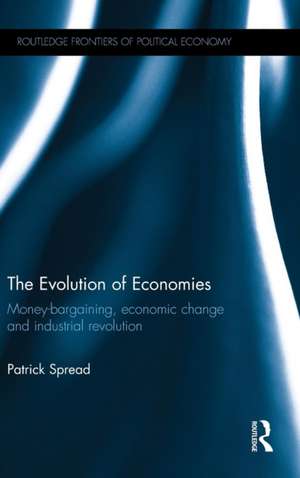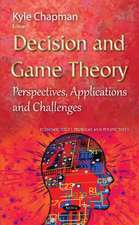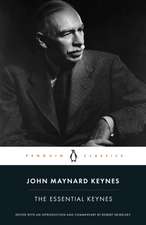The Evolution of Economies: Money-bargaining, economic change and industrial revolution: Routledge Frontiers of Political Economy
Autor Patrick Spreaden Limba Engleză Hardback – 8 dec 2015
The Evolution of Economies provides a clear account of how economies evolve under a process of support-bargaining and money-bargaining. Both support-bargaining and money-bargaining are situation-related - people determine their interests and actions by reference to their present circumstances. This gives the bargaining system a natural evolutionary dynamic. Societies evolve from situation to situation. Historical change follows this evolutionary course.
A central chapter of the book applies the new theory in a re-evaluation of the industrial revolution in Britain, showing how specialist money-bargaining agencies, in the form of companies, evolved profitable formats and displaced landowners as the leading sources of employment and economic necessities. Companies took advantage of the evolution of technology to establish effective formats.
The book also seeks to establish how it came about that a ‘mainstream’ theory was developed that is so wildly at odds with the observable features of economic history and economic exchange. Theory-making is described as a process of ‘intellectual support-bargaining’ in which theory is shaped to the interests of its makers. The work of major classical and neoclassical economists is contested as incompatible with the idea of an evolving money-bargaining system. The book reviews attempts to derive an evolutionary economic theory from Darwin’s theory of evolution by natural selection.
Neoclassical economic theory has had enormous influence on the governance of societies, principally through its theoretical endorsement of the benefits of ‘free markets’. An evolutionary account of economic processes should change the basis of debate. The theory presented here will be of interest immediately to all economists, whether evolutionary, heterodox or neoclassical. It will facilitate the work of economic historians, who complain that current theory gives no guidance for their historical investigations. Beyond the confines of professional theory-making, many will find it a revelatory response to questions that have hitherto gone unanswered.
| Toate formatele și edițiile | Preț | Express |
|---|---|---|
| Paperback (1) | 397.50 lei 43-57 zile | |
| Taylor & Francis – 30 sep 2020 | 397.50 lei 43-57 zile | |
| Hardback (1) | 1169.16 lei 43-57 zile | |
| Taylor & Francis – 8 dec 2015 | 1169.16 lei 43-57 zile |
Din seria Routledge Frontiers of Political Economy
-
 Preț: 309.90 lei
Preț: 309.90 lei -
 Preț: 309.79 lei
Preț: 309.79 lei -
 Preț: 316.03 lei
Preț: 316.03 lei -
 Preț: 310.55 lei
Preț: 310.55 lei - 9%
 Preț: 867.54 lei
Preț: 867.54 lei -
 Preț: 309.12 lei
Preț: 309.12 lei -
 Preț: 311.61 lei
Preț: 311.61 lei -
 Preț: 286.98 lei
Preț: 286.98 lei -
 Preț: 327.83 lei
Preț: 327.83 lei - 9%
 Preț: 1005.48 lei
Preț: 1005.48 lei -
 Preț: 386.11 lei
Preț: 386.11 lei - 9%
 Preț: 938.47 lei
Preț: 938.47 lei -
 Preț: 302.75 lei
Preț: 302.75 lei -
 Preț: 151.96 lei
Preț: 151.96 lei -
 Preț: 318.54 lei
Preț: 318.54 lei -
 Preț: 317.95 lei
Preț: 317.95 lei -
 Preț: 310.01 lei
Preț: 310.01 lei -
 Preț: 326.49 lei
Preț: 326.49 lei -
 Preț: 155.43 lei
Preț: 155.43 lei -
 Preț: 309.79 lei
Preț: 309.79 lei -
 Preț: 152.66 lei
Preț: 152.66 lei -
 Preț: 328.76 lei
Preț: 328.76 lei -
 Preț: 281.72 lei
Preț: 281.72 lei -
 Preț: 286.58 lei
Preț: 286.58 lei -
 Preț: 325.09 lei
Preț: 325.09 lei -
 Preț: 353.77 lei
Preț: 353.77 lei -
 Preț: 371.95 lei
Preț: 371.95 lei -
 Preț: 310.95 lei
Preț: 310.95 lei -
 Preț: 324.87 lei
Preț: 324.87 lei -
 Preț: 312.86 lei
Preț: 312.86 lei -
 Preț: 374.16 lei
Preț: 374.16 lei -
 Preț: 329.09 lei
Preț: 329.09 lei -
 Preț: 348.21 lei
Preț: 348.21 lei - 28%
 Preț: 1047.06 lei
Preț: 1047.06 lei - 18%
 Preț: 1169.45 lei
Preț: 1169.45 lei - 18%
 Preț: 1555.17 lei
Preț: 1555.17 lei - 18%
 Preț: 1048.43 lei
Preț: 1048.43 lei - 18%
 Preț: 1059.84 lei
Preț: 1059.84 lei - 31%
 Preț: 767.47 lei
Preț: 767.47 lei - 18%
 Preț: 731.92 lei
Preț: 731.92 lei - 26%
 Preț: 822.54 lei
Preț: 822.54 lei - 18%
 Preț: 1796.21 lei
Preț: 1796.21 lei - 26%
 Preț: 1184.91 lei
Preț: 1184.91 lei - 18%
 Preț: 1120.23 lei
Preț: 1120.23 lei - 15%
 Preț: 700.95 lei
Preț: 700.95 lei - 18%
 Preț: 1116.31 lei
Preț: 1116.31 lei - 22%
 Preț: 299.52 lei
Preț: 299.52 lei - 18%
 Preț: 999.46 lei
Preț: 999.46 lei
Preț: 1169.16 lei
Preț vechi: 1425.82 lei
-18% Nou
Puncte Express: 1754
Preț estimativ în valută:
223.71€ • 234.21$ • 185.11£
223.71€ • 234.21$ • 185.11£
Carte tipărită la comandă
Livrare economică 07-21 aprilie
Preluare comenzi: 021 569.72.76
Specificații
ISBN-13: 9781138122918
ISBN-10: 1138122912
Pagini: 348
Dimensiuni: 156 x 234 x 25 mm
Greutate: 0.61 kg
Ediția:1
Editura: Taylor & Francis
Colecția Routledge
Seria Routledge Frontiers of Political Economy
Locul publicării:Oxford, United Kingdom
ISBN-10: 1138122912
Pagini: 348
Dimensiuni: 156 x 234 x 25 mm
Greutate: 0.61 kg
Ediția:1
Editura: Taylor & Francis
Colecția Routledge
Seria Routledge Frontiers of Political Economy
Locul publicării:Oxford, United Kingdom
Public țintă
Postgraduate and UndergraduateCuprins
Introduction Chapter 1: Support-Bargaining and the Evolution of Human Societies Chapter 2: Money and Money-Bargaining Chapter 3: Macroeconomics and Money-Bargaining Chapter 4: Evolutionary Economics Chapter 5: The Evolution of Money-Bargaining Chapter 6: The State and Money-Bargaining Chapter 7: Support-Bargaining, Credit and Confidence Chapter 8: The Evolution of Foreign Trade Chapter 9: Information and the Evolution of Communications Conclusion Bibliography
Descriere
The Evolution of Economies provides a clear account of how economies evolve under a process of support bargaining and money bargaining. They both allow people to determine their interests and requirements by reference to their present circumstances. This gives the bargaining system a natural evolutionary dynamic, allowing society to evolve from situation to situation.
This book engages with the current body of work in evolutionary economics, but also departs from it in embarking on a systematic examination of its relationship with recorded economic history. At the same time, this book also explores how neoclassical theory came to be accepted as the mainstream theory of the workings of an economy, assessing the achievements of evolutionary economists. A central chapter is devoted to reinterpretation of the industrial revolution in terms of the evolutionary dynamic of money bargaining.
This book is of interest to those who study political economy, history of economic thought and international political economy.
This book engages with the current body of work in evolutionary economics, but also departs from it in embarking on a systematic examination of its relationship with recorded economic history. At the same time, this book also explores how neoclassical theory came to be accepted as the mainstream theory of the workings of an economy, assessing the achievements of evolutionary economists. A central chapter is devoted to reinterpretation of the industrial revolution in terms of the evolutionary dynamic of money bargaining.
This book is of interest to those who study political economy, history of economic thought and international political economy.









